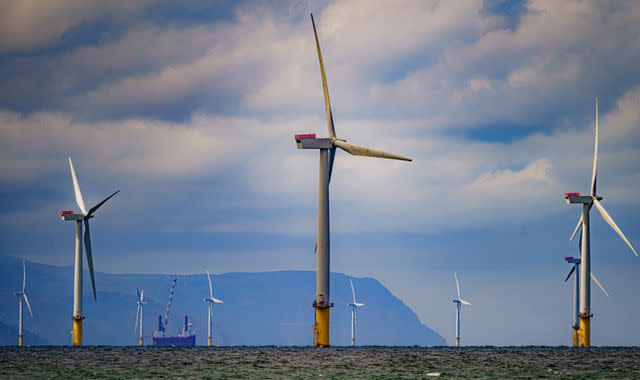General Election 2024: How do Labour and the Conservatives' energy pledges measure up?

Launching his plans for Great British Energy, a state-owned clean power company, Sir Keir Starmer promised the new entity would reduce bills, create jobs and deliver increased energy security.
Specifically, Labour's press release for an idea first announced in October 2022 said: "Great British Energy will cut energy bills for good, as families face the threat of £900 annual energy price spikes under Tories."
That claim is based on analysis of fluctuations in the energy price cap set by Ofgem and the prospect of soaring energy prices, triggered by global events - specifically, the Russian invasion of Ukraine - being repeated.
Labour's analysis of the price cap calculates that in the two years since April 2022, consumers have paid around £1,880 - or around £900 a year - more than they would if prices had remained at pre-war levels. The government also spent £94bn on the energy price guarantee, further capping bills at £2,500 per household.
While the £900 figure is correct, and energy bills remain well above the long-term average, the likelihood of further spikes depends on your reading of world events.
Where Labour and the Conservatives agree is that the way to increase energy security and cut bills is to accelerate the transition to renewable and low carbon sources of power. Where they differ is how fast that should happen.
Labour say the Conservatives have "blocked clean, homegrown power", and the data certainly demonstrates that new renewable capacity has slowed in recent years.
The UK currently has around 15GW of installed solar, onshore and offshore wind capacity, enough to provide more than 40% of UK electricity last year.
Onshore wind has effectively flatlined under the Conservatives in England because of planning restrictions - it remains an important part of Scotland's energy mix - while offshore wind, hitherto a success story, stalled last year when a government auction failed.
The government has targets to increase renewable capacity, but only in solar, up to 70GW, and offshore wind, for which the Boris Johnson-era target is 50GW by 2030. There is no target for onshore wind.
More from Sky News:
Starmer defends private jet use
Lib Dems announce free school meals plan
Labour want to go further and faster, building 35GW of onshore wind and 55GW offshore along with 50GW of solar capacity. Crucially, they want to decarbonise the grid entirely by 2030, five years earlier than the Conservative proposal.
Senior figures in industry, and even Labour, agree that is an extremely challenging target made harder to deliver by recent supply chain and inflationary pressures that have seen some UK projects put on hold.
Sir Keir said delivering Great British Energy will knock £300 off bills but that is a contested and complicated figure to break down.
Renewable energy is cheaper than fossil-fuel alternatives but only once you have built the infrastructure, much of which requires subsidy, and the cost of the electricity transition alone is put at more than £100m.
The majority of that will come from the private sector, into which the new state-owned entity will seek to compete.
Modelled on the French national provider EDF and Sweden's Vattenfall, both of which generate significant power in the UK, Labour envisage its entity as owning and operating major renewable generation assets in future, though not acting as a retailer.
Initial plans have been scaled back however at the behest of shadow chancellor Rachel Reeves, leaving £8.3bn to be invested over a five-year term. That's a lot for a state start-up, but relatively small in the energy sector.
Labour privately acknowledge it will take time to grow, but maintain that with access to capital on preferential terms enjoyed by government, and perhaps latitude for greater risk than other industry players, there is no reason the British state should not make profits from energy in the same way as France and Sweden.


